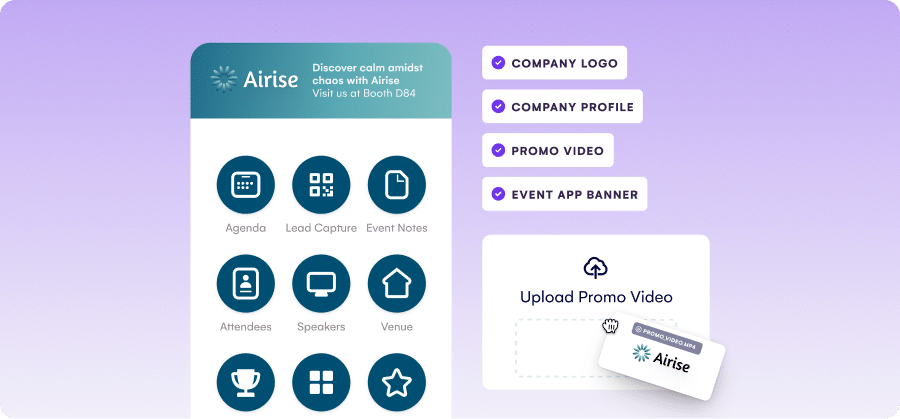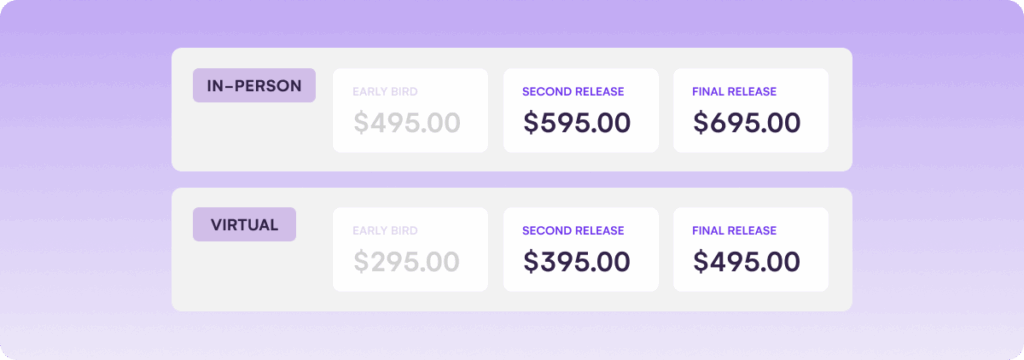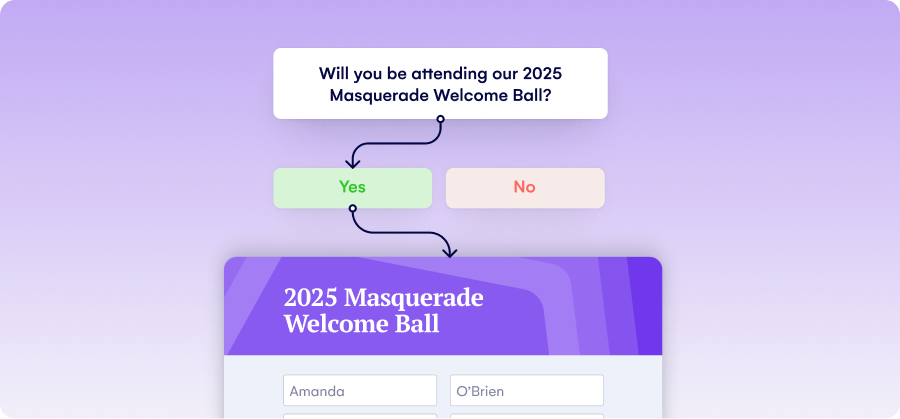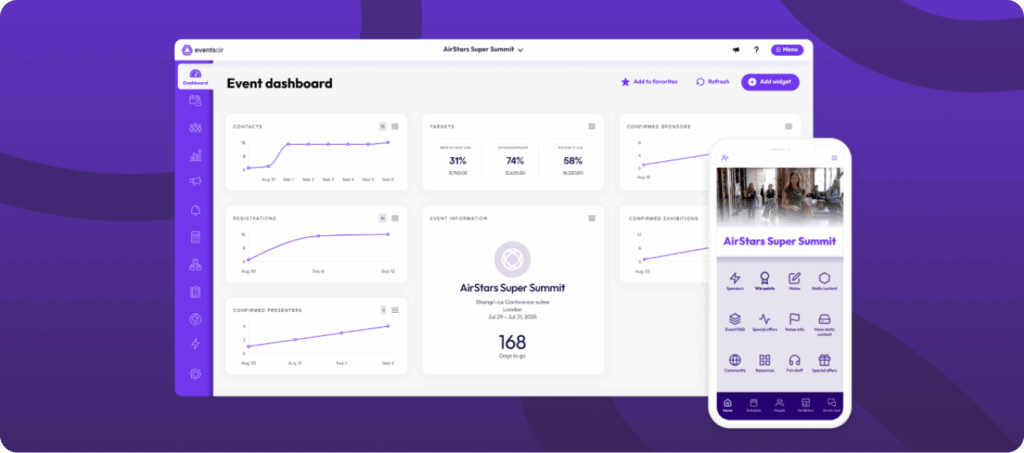
Successful events offer you opportunities to drive revenue, build brand loyalty, and create lasting connections. It doesn’t matter if you’re planning a corporate conference, trade show, or virtual summit, finding the right monetization strategy can make the difference between breaking even and generating substantial profits.
Gone are the days when ticket sales were the only source of income. Today, event organizers have access to a range of revenue-generating opportunities, from sponsorships and exhibitor packages to premium content and digital engagement tools. The key is to integrate these strategies seamlessly so that you can enhance the attendee experience while maximizing financial returns.
In this EventsAir guide, we’ll explore smart, scalable monetization strategies that help you transform your events into profitable ventures. Whether you’re hosting in-person, virtual, or hybrid events, these insights will empower you to optimize revenue streams while delivering value to attendees, sponsors, and stakeholders alike.
What is event monetization?
Event monetization is the process of generating revenue from events by leveraging various income streams beyond ticket sales. It involves strategically incorporating sponsorships, exhibitor opportunities, premium content, merchandise, and digital engagement tools to create a financially successful event.
Whether your event is in-person, virtual, or hybrid, the goal is to maximize revenue while enhancing the overall experience for attendees, sponsors, and stakeholders.
Successful event monetization isn’t just about selling more – it’s about creating value. Sponsors want access to engaged audiences, attendees seek memorable and exclusive experiences, and exhibitors look for meaningful connections. By aligning your revenue strategies with these needs, you can develop a monetization model that benefits all parties while ensuring a profitable and sustainable event.
The benefits of event monetization
Monetizing an event is about maximizing value, ensuring financial sustainability, and enhancing the attendee experience. Without a solid revenue strategy, even well-planned events can struggle to reach their full potential.
Here’s why event monetization matters:
Increased revenue streams
Relying only on ticket sales can really limit your earning potential. By mixing things up with sponsorships, exhibitor fees, premium content access, and digital advertising, you can create a more stable and profitable event.
For example, virtual events could offer pay-per-view sessions, while in-person conferences might include VIP upgrades or branded merchandise. Diversifying your revenue streams makes a big difference.
Enhanced attendee experience
A well-monetized event isn’t just about generating revenue, it’s also about creating a better experience for attendees. Things like premium networking sessions with keynote speakers, interactive master classes, and premium content add real value and keep people excited and engaged.
For example, offering a VIP package with priority access to keynote speakers can make attendees feel special and more willing to invest in their experience.
Stronger sponsor & exhibitor relationships
Sponsors and exhibitors want real connections with your audience. Offering branded sessions, digital ads, and sponsored content, allows businesses a chance to engage with attendees in a more impactful way. When sponsors see great results from their investment, they’re more likely to support your future events, building stronger partnerships over time.
Extended event lifespan
By using on-demand content and post-event engagement, you can keep earning revenue even after your event wraps up. Think recorded sessions, exclusive interviews, and downloadable resources – these can all be offered as paid content. It’s a great way to keep the momentum going and get even more out of your event.
Greater financial stability & scalability
Monetized events give organizers a more reliable way to generate revenue, making budgeting and planning much smoother. With a solid monetization strategy, it’s easier to grow future events, add new offerings, and invest in tools to make the overall experience even better.
How to monetize an event effectively
Quick look at 12 event monetization strategies
- Secure high-value sponsorships
- Mobile app monetization
- Affiliate marketing and influencer partnerships
- Monetize content and experiences
- Use digital advertising and branded engagement
- Offer tiered ticketing options
- Maximize exhibitor revenue
- Offer add-ons and upgrades
- Sell event merchandise
- Host paid workshops and masterclasses
- Extend revenue post-event
- Subscriptions and memberships
Monetizing an event successfully requires a strategic approach that balances revenue generation with attendee experience.
Fortunately, event monetization is highly adaptable. Whether you’re organizing a large-scale industry conference, an intimate networking event, or an online summit, there are numerous ways to generate income and increase the financial impact of your event.
Here are key steps to ensure your event maximizes its financial potential:
Digital monetization opportunities
1. Secure high-value sponsorships
Sponsorships are one of the best ways for events to bring in revenue, but landing high-value sponsors means offering tailored, data-driven opportunities that match their goals. The old generic sponsorship tiers just don’t cut it anymore – custom activations, digital branding, and clear ROI are the keys to success.
Here’s how you can attract and optimize sponsorship opportunities:
- Build tiered sponsorship packages – Create gold, silver, and bronze options with clear perks, but stay open to customizing activations to fit sponsor needs.
- Add digital sponsorships – Use virtual booths, sponsored content, branded networking sessions, and in-app ads to give sponsors exposure beyond the event space.
- Show real value – Sponsors love clear ROI. Offer lead capture analytics, attendee engagement insights, and session tracking to show their impact.
- Include speaking opportunities – Give sponsors a chance to shine with panel spots, keynotes, or exclusive roundtables to showcase their expertise.
- Monetize fun engagements – Charge for sponsored push notifications, interactive challenges, or branded session breaks to boost sponsor visibility in a creative way.
Managing multiple sponsor activations requires seamless execution. The good news is EventsAir provides sponsorship and exhibitor management tools that help organizers track deliverables, integrate sponsor branding into event platforms, and generate real-time engagement analytics.
2. Leverage mobile app monetization
Event mobile apps are a valuable, underutilized revenue channel. If your event platform supports in-app advertising or branded engagement, you can turn attendee screen time into a consistent income stream.
Ways to implement this effectively:
- Sponsored push notifications: Send targeted, branded messages during key sessions or networking breaks.
- Banner placements: Offer rotating ad space within the event agenda, speaker profiles, or newsfeed.
- Gamified challenges: Drive sponsor visibility with branded leaderboards or prize-backed digital games.
EventsAir’s branded mobile apps allow organizers to integrate these monetization models seamlessly. Sponsors can access real-time analytics, track impressions, and measure ROI through built-in engagement dashboards. This ensures that monetization enhances user experience rather than distracting from it.

3. Use affiliate marketing and influencer partnerships
Affiliate and influencer partnerships can drive measurable event registrations and sponsorship visibility without major upfront spend.
Effective tactics include:
- Influencer-led ticket campaigns that use trackable referral links or unique discount codes.
- Branded collaboration content like behind-the-scenes videos or event previews shared on partner channels.
- Commission-based partnerships for affiliates who promote your event to their audiences.
With EventsAir’s integrations and data reporting, organizers can monitor referral conversions, automate affiliate tracking, and evaluate campaign ROI in real time. This ensures your partnership strategy remains performance-driven and transparent.
4. Monetize content and experiences
A single event can generate revenue long after it ends if organizers strategically monetize digital content. Virtual and hybrid events open up new revenue streams beyond ticket sales, from paywalled content to sponsorship-driven digital experiences.
Here are some examples for this:
- Paywalled on-demand access – Let attendees who missed the live event catch up with recordings, exclusive interviews, or behind-the-scenes content.
- Virtual & hybrid sponsorships – Boost sponsor visibility with options like sponsored videos, exhibitor banners, or branded networking lounges.
- Premium virtual ticketing – Offer tiered virtual passes for access to perks like exclusive Q&As, VIP online networking, and interactive workshops.
- Microtransactions & upsells – Provide extras like workshop materials, downloadable presentations, or exclusive industry reports for a small fee.
- Monetized virtual exhibitor booths – Give exhibitors extra value with lead capture tools, branded demos, and sponsored video content.
Managing hybrid and digital content monetization requires seamless access control and payment processing. EventsAir enables organizers to lock content behind paywalls, set tiered access levels, and track user engagement in real time, ensuring a frictionless revenue model.
5. Use digital advertising & branded engagement
If your event has a solid online presence, digital advertising can be a great way to boost both visibility and revenue for your event. Sponsored emails let you connect directly with your target audience using personalized messages, while in-app promotions keep attendees engaged with timely, event-specific content.
Branded social media campaigns not only spread the word but also give sponsors a chance to connect with potential customers in a meaningful way. By tapping into these digital strategies, you can expand your event’s reach, keep your sponsors happy, and unlock new opportunities for revenue.
In-person and hybrid revenue streams
6. Offer tiered ticketing options
A one-size-fits-all ticketing approach can miss out on opportunities to boost revenue. Using a multi-tiered pricing strategy allows you to cater to different attendees by offering options based on access, perks, and exclusivity. Plus, tiered pricing adds a sense of value, encouraging people to spend more for premium experiences.
Here are some examples of multi-tiered ticketing structures you can use:
- Early-bird & dynamic pricing – Kick things off with limited-time discounts to encourage early sign-ups, then gradually raise ticket prices as the event gets closer.
- VIP & premium access – Treat high-ticket attendees to special perks like private networking, backstage passes, or the best seats in the house.
- Hybrid & virtual options – Offer virtual-only tickets with access to live streams, on-demand content, and fun online networking spaces.
- Group & corporate packages – Give teams, associations, or industry groups a reason to join with discounts for bulk ticket purchases.
To manage complex ticketing options efficiently, organizers will need a flexible event registration system. Fortunately, EventsAir allows event planners to customize ticket types, apply discount codes, automate access control, and manage attendee categories effortlessly. This ensures seamless ticketing for in-person, virtual, and hybrid events while maximizing conversion rates.

7. Maximize exhibitor revenue
For in-person events, exhibitor booths and vendor partnerships are great ways to boost revenue while giving businesses a chance to shine. Offering a mix of booth sizes – from small tabletop setups to large, custom displays – makes it easy to welcome companies of all sizes.
Try introducing sponsorship tiers to suit different budgets, including premium options with standout branding or exclusive perks. Don’t forget about digital opportunities too. Event app ads, live-stream banners, or social media shoutouts help your partners get even more visibility. These strategies not only bring in extra revenue but also create value for exhibitors looking to connect with your audience.
8. Offer valuable add-ons
Strategic add-ons turn essential logistics into revenue opportunities while improving convenience for attendees. These can be integrated directly into the registration or check-in workflow for a frictionless purchase experience.
Examples include:
- Parking and transportation passes for large in-person events.
- Meal packages that cater to dietary preferences or offer upgraded dining experiences.
- Optional workshops or tours added at checkout to enhance perceived value.
EventsAir simplifies this with customizable registration workflows, allowing planners to create and manage optional extras, apply pricing rules, and process payments automatically. Each add-on contributes to incremental revenue while improving attendee satisfaction and operational efficiency.

9. Sell event merchandise
Branded merchandise like T-shirts, notebooks, and accessories can be a great way to bring in extra revenue while also spreading the word about your business or event. These items give your customers or attendees something cool to take home, keeping your brand fresh in their minds.
Offering limited-edition or event-only goodies makes things even more exciting. It encourages people to get involved, creates a sense of exclusivity, and helps build brand loyalty. Plus, it’s a great way to spark conversations and leave a lasting impression long after the event ends.

10. Host paid workshops and masterclasses
Workshops and masterclasses create premium learning experiences that attendees are willing to pay for, especially when the content is exclusive or hands-on.
To maximize value:
- Offer limited-capacity training with expert facilitators or industry leaders.
- Provide exclusive materials or certifications to boost perceived value.
- Create tiered pricing (e.g., group or early-bird discounts) to encourage sign-ups.
Using EventsAir’s management tools, organizers can easily set up these sessions as paid modules, manage attendee limits, and handle integrated payments. Real-time analytics also help track engagement and conversion, giving you insight into which sessions drive the most revenue.
Long-term and recurring monetization strategies
11. Extend revenue post-event
Monetization doesn’t have to end when your event does. You can offer recorded sessions, transcripts, and follow-up workshops as paid content to keep the momentum going. Subscription-based memberships or year-round community access are also great ways to keep attendees engaged while creating a steady revenue stream.
12. Build recurring revenue with subscriptions and memberships
Instead of relying on one-time event income, introduce membership or subscription models that provide continuous engagement and stable cash flow.
Practical ways to apply this:
- Exclusive member portals with access to past session recordings, resources, or early-bird ticketing.
- Tiered memberships offering benefits like discounts, private networking sessions, or sponsor perks.
- Community access models that keep audiences connected between events through ongoing content or discussions.
By combining EventsAir’s attendee management and attendee engagement tools, organizers can automate renewals, manage member tiers, and analyze retention data. This transforms event participation into a year-round ecosystem that sustains long-term loyalty and recurring revenue.

Turn your event into a profitable success with EventsAir
Monetizing an event requires a strategic mix of ticketing, sponsorships, exhibitor revenue, digital content sales, and upsells. By leveraging these revenue streams, organizers can increase event ROI while delivering exceptional value to attendees and stakeholders. The right tools make execution seamless.
EventsAir provides end-to-end event management solutions that help organizers maximize revenue with multi-tiered ticketing, sponsor activations, exhibitor portals, and integrated payment processing. Whether you’re hosting an in-person, virtual, or hybrid event, EventsAir ensures a smooth, scalable monetization strategy.Ready to maximize your event revenue? Book a demo with EventsAir today!
Best Practice | Event Data & Analytics
See EventsAir in action
Discover why 12,000+ event professionals trust EventsAir to deliver effortless events, every time.




